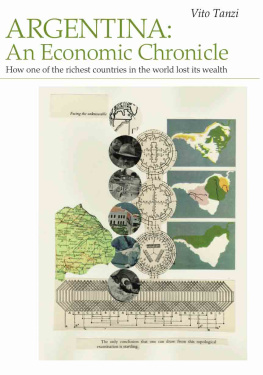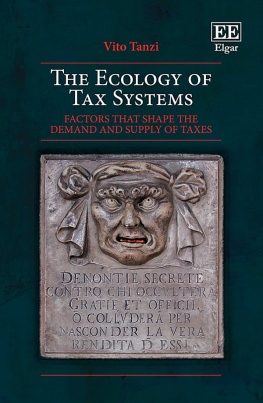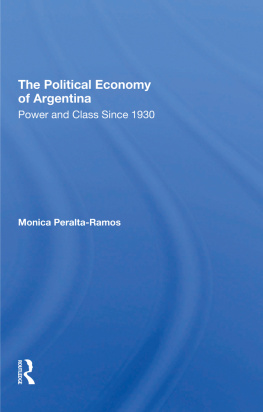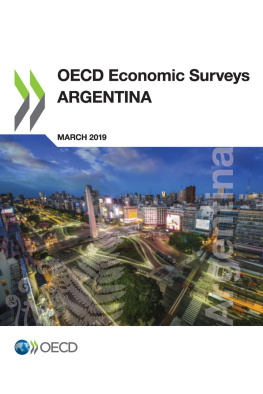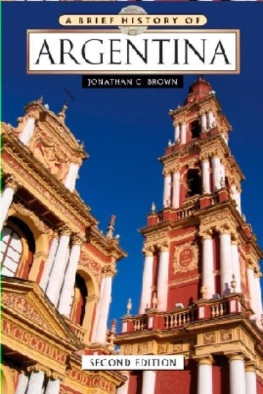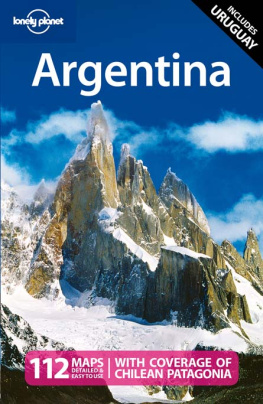Argentina : An Economic Chronicle.
How one of the richest countries in the world lost its wealth
By
Vito Tanzi
Jorge Pinto Books Inc.
Argentina: An Economic Chronicle.
How one of the richest countries in the world lost its wealth
Copyright 2007 by Vito Tanzi
All rights reserved. This book may not be reproduced in whole or in part, in any form (beyond copying permitted by Sections 107 and 108 of the United States Copyright Law, and except limited excerpts by reviewer for the public press), without written permission from Jorge Pinto Books Inc. 151 East 58th Street, New York, NY 10022.
Published by Jorge Pinto Books Inc., website: www.pintobooks.com
Cover design 2007 by Susan Hildebrand
Cover Image: Pablo Heguera Facing the Unknowable collage, 2007, from the series Panamerican Suite . Courtesy of the artist. Website: www.panamericanismo.org
Edited by Nol Baca Castex
Book design by Charles King, website: www.ckmm.com
ISBN 0-9795576-0-7
978-0-9795576-0-6
Table of Contents
Preface
Over the past century Argentina has often attracted the attention of the world. Its size (five times bigger than France and nine times bigger than Italy), its physical beauty (Iguaz, Bariloche, Patagonia), its culture, and, until the earlier part of the twentieth century, its wealth, made it a strong magnet for European emigrants looking for a better life. It is difficult to believe today that, at some point during the last century, Argentina accounted for 7 percent of the world exports and for half of the gross domestic product of Latin America. In other words, it was a major economic power. For many poor Europeans, the American dream could be achieved in Argentina and not just in the United States. Thus, they moved there in the millions, especially before World War I and after World War II.
The flow of European emigrants toward Argentina continued until around 1950, when Pern was president and in the process of creating a welfare state. At that time, Argentina was still a rich and welcoming country where poor immigrants from Europe were not discriminated against and where they could live comfortably, eat well, and hope that their children would move up socially. The welfare state Pern created, possibly the first one in the world, along with Uruguays, contributed to the attraction that Argentina held for those who left Europe. Then, European immigrants stopped coming. A couple of decades later, some even started going back to the places they had come from. Argentina started the twentieth century as one of the worlds richest countries and ended it with a lot of poverty and the stigma of having experienced the largest default on foreign debt in the history of the world.
Economists are very interested inand often talk and write a great deal abouteconomic development. This is the process, observed in many countries, by which poor nations become rich. Strangely, there is no good word to describe the reverse experiencethe process by which a rich country becomes poor. If such a word existed (impoverishment comes close), it would describe what happened to Argentina over the past century, especially during the second half of it. There are now several good books written by economists and economic historians that, with the help of numerous statistics, describe the process of the progressive impoverishment of Argentina. The aim of this book is not to provide another technical description of its economic decline. Rather, it is mainly to provide a description of the changes that took place over half a century, through episodes I participated in as an employee of international institutions and, especially, as a senior staff member of the International Monetary Fund. Over the course of more than three decades, I visited Argentina at least thirty times and have spent, cumulatively, several months there. This privileged position put me in contact with many of those making economic decisions as well as with economists and regular citizens. As a result, I was able to observe policy in the making, to occasionally participate in that process, and to witness the effects of the policy decisions as well. This opportunity is rarely experienced by writers of economic books.
This book has not been written for specialists, but for the general reader with some interest in Argentina and a minimum background in economics and fiscal issues. Readers who found Joe Stiglitz book on globalization ( Globalization and its Discontent ) interesting should also enjoy this book. I have used a simple style with minimal economic jargon in order to keep the freshness of a memoir and to make it accessible to a wide range of readers. Those with an interest in economics and fiscal matters should find the descriptions of fiscal developments of particular interest. But the book covers more than just economics so those without a background in economics should still be able to enjoy it.
The book contains several stories that will help make particular points and that, I hope, will entertain as well as inform the reader. These stories should provide an intuitive appreciation of what happened to this fascinating country over the past half century. Considering the events that occurred in recent years, I could not fail to address the relationship between the country and the IMF. This relationship has been much in the news and has been strongly criticized in recent books such as Joe Stiglitz Globalization and Its Discontent , Paul Blusteins And the Money Kept Coming in (and Out) , and Ernesto Tennembaums Enemigos . My book discusses this relationship in a couple of chapters and finds much to criticize in the role of the IMF. However, the reasons I present are different from those given by the authors mentioned above.
Modern books are expected to fit within distinct categories. The modern world likes to classify things. Thus, there are books that deal with economics; travel; cultural developments, politics, cooking, and so on. This book does not easily fit in any specific category because, being largely a memoir, it describes events, places, and people as they were seen by the author during his many trips. Some of these descriptions will be enjoyed by those who are interested in Argentina, but less by those who are interested in economics only. There are two specific filters that have affected the narrative: The first one is the authors professional background; the second one is his national background. Being an economist and an Italian from the south of Italy, the area where many of the poor immigrants came to Argentina from, have inevitably colored the description.
Numerous people have contributed, directly or indirectly, to the writing of this book. Many of them have been mentioned in the various chapters. I have resisted the temptation, common among writers, of providing a long list of names. The objective of these long lists seems to be mainly impressing the reader. However, there are a few people who could not be ignored.
I am especially grateful to four Argentine friends who have carefully read earlier drafts of the manuscript, given me advice and corrected mistakes. My great thanks go to Alieto Guadagni, Humberto Petrei, Mario Teijeiro and especially Carlos Silvani. They are all well-known and knowledgeable Argentine economists who have held important positions during various Argentine administrations and/or in the Argentine financial system. Because I did not always follow their advice, they are not responsible for any remaining errors or for any opinions expressed. For these I am strictly and solely responsible. I am also grateful to Domingo Cavallo, Eduardo Cavallo, George Kopits, and Axel Radics, who have read later versions of the manuscript and have also given me valuable suggestions. Again, they are not responsible either for any errors or particular interpretations of events.
Next page
